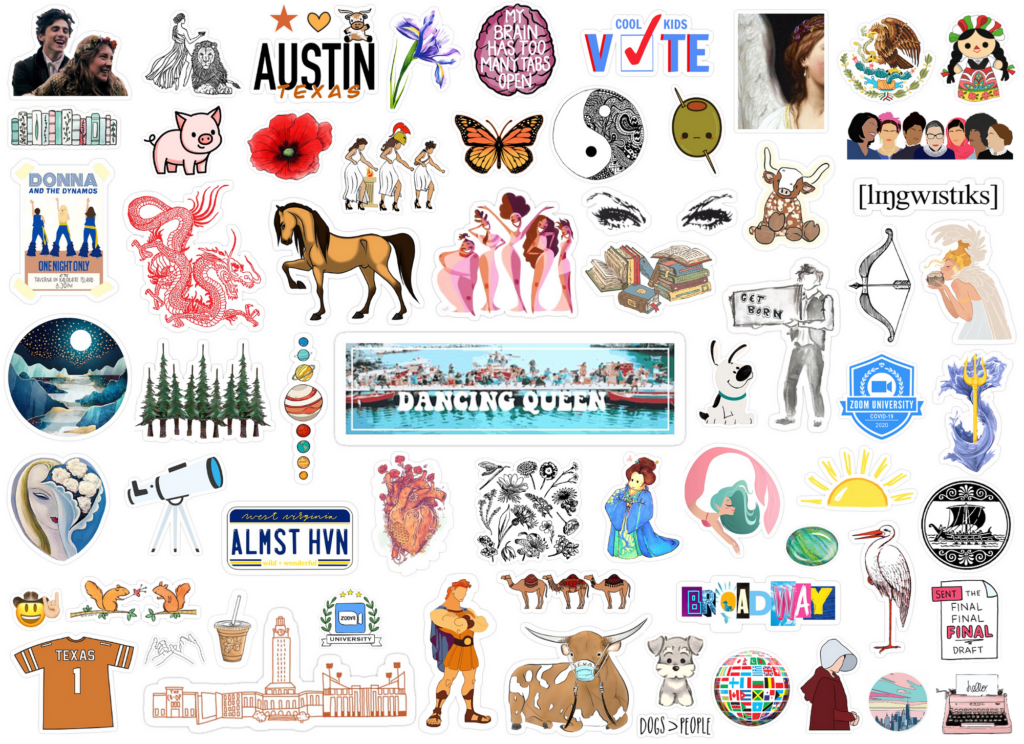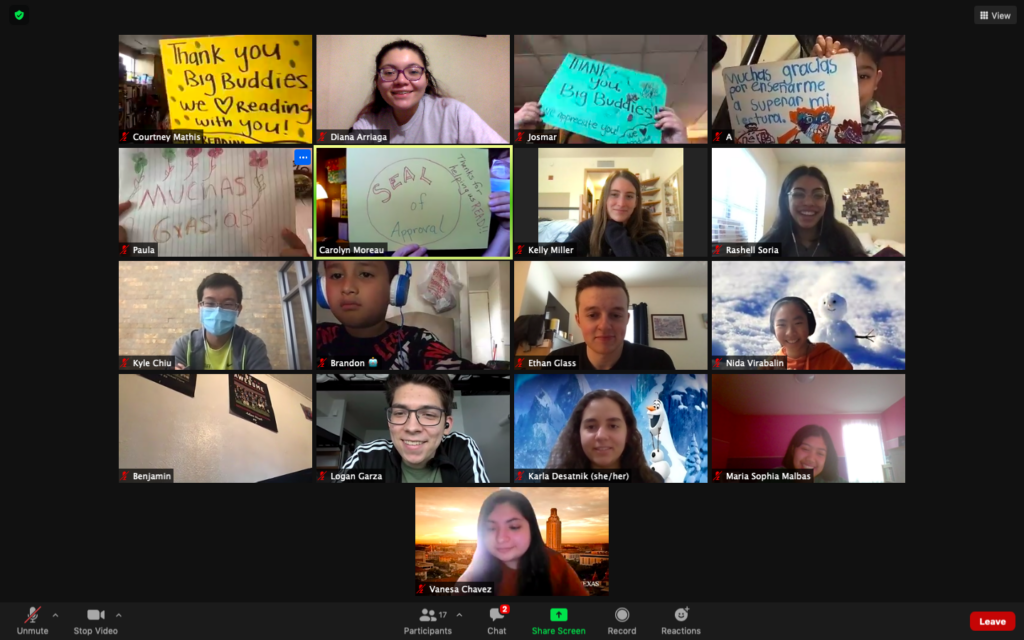It’s your favorite over-caffeinated, language-loving, Plan-II-majoring, pink-haired rising sophomore, Diana Arriaga, here! I know that introduction was a handful, but to be fair, so was my freshman year! Since this blog last heard from me, I’ve been up and about–as much as one can virtually. These past two semesters have been filled with studying, reading and learning, but they have also included clubs and new friendships. Here’s what I’ve discovered in my first year at UT.
I am passionate about language.
This past year, I took two year-long courses, World Literature and Quechua, an Indigenous Latin American language. World Lit took me on a trip to Africa, China, and Ireland through novels and films; from Yu Hua’s To Live to James Joyce’s A Portrait of the Artist as a Young Man to Alan Parker’s The Commitments. Each story gave me a glimpse of the world beyond my backyard. I immersed myself in Andean culture through Quechua, an ancient tongue that ties the past to the present. I was able to tie these courses together through an understanding of language and colonization.
For my final paper in my World Literature class, I chose to discuss what is lost and gained through translation, focusing on specific passages from Joyce’s Portrait. I compared the Spanish translation to the English translation we read; even with footnotes, the meaning of phrases and allusions, which spanned from Dante to Socrates to Thomas Aquina, was muddled. Joyce faced a dilemma in presenting Irish life without writing in Irish; he chose to write in Hiberno-English, or Irish-English, to challenge the dominant English culture present in Ireland. Through his masterful prose, Joyce challenged the linguistic expectations of language as a straightforward medium of communication, overthrowing English as the established literary medium simultaneously.
In the Andes, a similar relationship exists between Quechua and Spanish; they are in constant contact with each other, but their history reveals the colonization of the people in the Andes. A ‘borrowed’ language, like English and Spanish, can make familiar ideas feel foreign because of the historical and sociocultural weight it bears in the mouths of different speakers, especially those on opposing sides of colonial history. Translation can fail to address these colonial undertones depending on the language or dialect used; for example, Spain was an empire, as was Great Britain, but Ireland and Mexico were colonies. Consequently, translating Joyce’s political intent behind the usage of Hiberno-English is difficult to recreate in another language, especially one without a history of colonialism; the same happens when one attempts to translate words in Spanish or English into Quechua.
I truly enjoyed expanding my interest in languages through these classes, as I delved into issues that must be addressed. Quechua class also introduced me to linguistic discrimination and the negative effects of this disparity. Language is inexplicably tied to identity, and I hope to continue exploring it throughout my academic career.

Another class I took during the fall, my Plan II Tutorial Course, was Nice, Shy, Quiet, Awkward. Led by Dr. Chad Bennett, the class studied these four words through specific texts and films, including Maud Martha, Moonlight, and On Earth We’re Briefly Gorgeous. One essay I wrote for the course, “Breaking the Chains of Niceness,” placed third in the Critical/Persuasive category of the 2020 UGS Student Writing Flag Contest Award. Ever since I was introduced to Spelling Bees, I became an avid lover of words. I enjoyed tracing their etymology, their trips around the globe, as pronouncing the words connected me to their journeys. I learned new words simply for the different sounds English offered – discombobulated, scintillating, askew. Thus, the logophile in me leapt at the chance to dissect the word nice beyond origin and usage but in action, too. By exploring the change in definitions over time, the power of words in the construction of social identities was explored. I connected the usage of nice to negative effects on women’s identities and positions of power, and I explored how women broke stereotypes by turning the same word against oppressors, regaining control of their image.
I am forever grateful that this course allowed me to combine my long-standing passion for words, the critical construction of social identities discussed in class, and the current issue of gender inequality in my essay. I believe that it’s not only what you say but how you say it that matters because words hold power beyond paper. Words are part of our identity; they help us understand ourselves and others, while also enabling us to solve complex problems and learn new information.
My love of languages has allowed me to experience my first year on the (virtual) 40 Acres passionately. I have found ways to combine my penchant for words with material from class, independently fostering it through extracurriculars. I am not only giving back to the country I come from but also representing the university that has inspired me to grow through service and scholarship. This encouraged me to apply for an internship course with the University Writing Center, where I will help students develop their English and Spanish writing, thus growing professionally and academically through the skills I acquire.
I am passionate about international relations.
I am also involved in the Mexican American Cultural Committee, which seeks to promote the culture and educate others on it through school activities in partnership with UT Events and Entertainment. I organized several events, including the annual Spanish Conversation Hour, where students practiced their Spanish in a casual setting. As an international student, I am always eager to share my culture and traditions, advocating for global perspectives across disciplines.
Additionally, I am delighted to have been selected for the internship between Plan II and the Lozano Long Institute of Latin American Studies (LLILAS), which will commence in the fall. This summer, I will take classes from home to advance my degree completion. I will also participate in NEW Leadership, a national nonpartisan program that addresses the underrepresentation of women in American politics and encourages them to become effective leaders in the political arena.
I am also involved in Generation United Nations, which seeks to raise awareness about human rights issues through social campaigns and service projects; this past semester, I drafted a letter to Congressmembers, asking them to pass legislation that would help protect protestors in Hong Kong. The club also executed fundraisers to support organizations advocating for the same cause. Through bi-monthly meetings, I have learned about other cultures and worldwide problems.
I am passionate about community service.
To pursue social causes I am passionate about, I have joined several clubs on campus. I am part of the UT Service Scholars, a close-knit group of students who perform community service in Austin by helping non-profit organizations. Through the club, I have participated in virtual service opportunities, such as writing Valentine’s Day cards for children in St. Jude’s.

Additionally, I am involved in SEAL, Students Expanding Austin Literacy; the club pairs college and elementary students as reading buddies. Through weekly Zoom meetings, I discussed books with students, promoting a love for reading, and bolstering their self-confidence. As an individual who learned English as a second language, I understand the challenges reading in English can pose. This inspired me to join the club; I aim to make a difference in the students’ lives by acting as a role model for them and associating reading with a positive experience. I also advocated for mitigating educational gaps last semester, as I tutored young students in different subjects through the Refugee Student Mentorship Program.
Recently, I became a member of the Gamma Beta Phi Society; this national honors and service organization values service, scholarship, and character. Through leadership opportunities and networking events, the Society seeks to prepare members to make a difference in the world after graduation. I will be the Treasurer for the Society, responsible for overseeing the general financial affairs of the club; I am excited to design and implement creative fundraisers in the coming years.
I am proud to say I am a new member of Texas Phanos, an organization that selects outstanding undergraduate students to represent the College of Liberal Arts in various capacities, including recruiting and fundraising events.
Additionally, I joined the Community Engagement Collective (CEC), a new initiative of the Division of Diversity and Community Engagement; this network brings together students from every place on campus, uniting them through a shared passion for community engagement, social justice, and active citizenship. As a Trip Leader on the Trips Committee, I am responsible for creating an Alternative Break trip curriculum that focuses on enhancing participants’ experience. The curriculum will allow members to learn about and develop a relationship with the community they are helping through relevant social justice issues.
As a member of Students Fighting Climate Change at UT, I delved into environmentalism and its relationship with race and gender. The club emphasizes advocating for more sustainable practices around campus and the greater Austin community. It also led me to participate in a focus study group about the intersection of sustainability and race, which revealed the issue of food deserts, a cause I am now passionate about.
These clubs have molded me into a responsible citizen of the world, a better student, and an individual open to different perspectives. I learn from each person I interact with, embracing teamwork to enact solutions and support modern issues that must be resolved.
Through these experiences, I have become a well-rounded individual, managing my time to both focus on my studies and also continue serving my community. I am excited to advance my career at the university, opening doors for additional opportunities that allow me to put my majors and ideas into practice.
